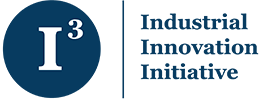2022: A Year of Industrial Innovation
As the year draws to a close, we reflect upon the many strides the US took down the path toward industrial decarbonization in 2022. The federal government passed and began implementing historic climate legislation, while states made their own commitments and plans to cut emissions from the industrial sector.
“Collaborating with the I3 coalition has allowed CATF to better understand industry perspectives on industrial decarbonization. We have greatly appreciated having this avenue to learn and engage with a broader coalition on US state and federal climate policies.”
Angela Seligman, Ph.D., Senior Manager, U.S. State Policy and Advocacy, Clean Air Task Force
The Industrial Innovation Initiative tracked and influenced these efforts across the US; connecting our industrial, labor, environmental, and analytical stakeholders with decision-makers and with each other in efforts to put American industry on a path toward net-zero emissions by midcentury.
The Bipartisan Infrastructure Law & The Inflation Reduction Act
Throughout 2022, the political and legislative landscape has changed significantly and the opportunities for industrial decarbonization have never been greater. With recent industrial innovation policies, including Executive Orders, the Bipartisan Infrastructure Law (BIL), and the budget reconciliation package, known as the Inflation Reduction Act of 2022 (IRA), the movement to cut climate-damaging emissions from our industrial sector secured several monumental wins.
Implementation of the significant investments made in the Bipartisan Infrastructure Law of 2021 began in earnest this year and to date, the Biden-Harris Administration has delivered over $185 billion in funding to states, tribes, territories, and local governments. The scope of this investment is traceable, with thousands of projects already announced – representing just a fraction of what’s to come.
This year the US Department of Energy released Funding Opportunities for both the Regional Clean Hydrogen Hubs Program, which will lay a foundation for the US clean hydrogen economy, and Direct Air Capture Hubs Program, which will stand up a network of carbon capture facilities critical for removing carbon emissions from the atmosphere. In June, I3 gathered Initiative participants, prospective hubs applicants, and DOE leadership for a day of collaboration in Washington D.C., to discuss the challenges and opportunities these hubs present.
This summer also saw the passage of the highly anticipated budget reconciliation package, the Inflation Reduction Act of 2022, which supports the financial and tax mechanisms necessary to bring decarbonization solutions to scale and meet midcentury climate goals. These investments, paired with the provisions within the BIL, make industrial decarbonization solutions more economically and technically feasible than ever before.
Federal agencies, including the US Department of Energy, General Services Administration, Internal Revenue Service, and Treasury Department issued requests for information and comment to help inform the frameworks and considerations necessary to ensure the effective implementation of these critical programs. I3 staff, with input from the Initiative’s Federal Working Group, submitted responses to eight such requests as they relate to our policy priorities this year.
Read our Responses Here → and Here →
State Strides to Decarbonize Industry
Just as there is no one-size-fits-all solution for decarbonizing the industrial sector, every state has a unique set of decarbonization needs based on emissions profile, available resources, geography, and other factors. Increasingly, states are working to develop robust decarbonization plans supported by regulatory and policy frameworks that take these unique needs into consideration.
In February, I3 partnered with the National Association of State Energy Officials (NASEO) to host a webinar for our respective members, discussing the opportunities for industrial decarbonization within states. This initial conversation set the stage for I3’s growing emphasis on decarbonization work at the state level.
In 2022 the Initiative worked with the states of Michigan and Louisiana to consider the needs particular to each state and connect their offices with our participants. In January, the Michigan Council on Climate Solutions released an early iteration of the plan for public input, for which I3 submitted comments calling for additional action for the plan’s decarbonization strategies for industry. The plan, released in April, included much more robust industrial considerations, taking many of our recommendations into account.
Louisiana is the only Gulf Coast state with a climate action plan — and considering nearly 60 percent of the state’s emissions profile can be attributed to the industrial sector, industrial decarbonization will be key to achieving emissions reduction goals in the state. Building relationships with the Louisiana Governor’s office, I3 participants were briefed on the state’s Climate Action Plan and have begun collaborating on policy and analysis to help support the plan’s implementation. In October, participants traveled to New Orleans, Louisiana to hear from DOE leadership, and meet with state officials, local labor representatives, the Baton Rouge Area Chamber, and local industry leaders to discuss the importance of state action for industrial decarbonization.
States will play a critical role in reducing US industrial emissions. Supported by recent federal programs and funding, states can craft a regulatory and policy landscape that spurs local action, drives private investments, and complements federal incentives. I3 staff, with input from the Initiative’s State Working Group, developed a cross-cutting guide which outlines best practices and examples from recent state legislation across the country to aid decision-makers and advocates seeking to develop policy.
Understanding Industrial Sectors and Solutions
In addition to our work on Federal and State initiatives, I3 also strives to educate and increase understanding of the challenges and opportunities inherent to each of our industrial sectors.
“Advanced nuclear energy can make a major contribution to industrial decarbonization. Its role will vary based on the specific industrial application and advanced reactor technology. Participating in the I3 initiative has allowed NIA to collaborate with industry, labor, and other NGOs on industrial decarbonization policy creation and implementation using all promising technologies, including advanced nuclear energy.”
Victor Ibarra Jr., Analyst, Nuclear Innovation Alliance
Through discussions among participants, outside experts invited to speak at I3 meetings, and more formal factsheets and publications, the Initiative provided many opportunities for our participants to learn from and share insights with each other.
Conclusion
I3 values a stable climate, a safe and healthy environment, thriving livelihoods for American workers, and a strong US economy. Industry represents approximately 30 percent of the US emissions profile. Federal action, paired with state-level policies and regulations, will be critical for decarbonizing this critical sector of the US economy. This year, our members demonstrated their commitment to putting American industry on a path to achieve net-zero emissions by midcentury, while supporting high-wage job retention and creation, technology leadership, and economic competitiveness. Continued policy advocacy and effective implementation of 2022’s many legislative wins will be vital to ensuring we achieve our climate goals in a way that is good for the environment, protects communities, and supports the US industrial sector.
Keep up to date with I3 news by signing up for our monthly newsletter. For more information about I3 or to get involved, contact David Soll at dsoll@gpisd.net.

